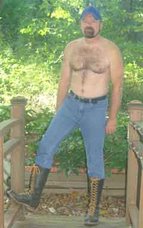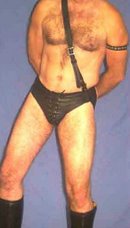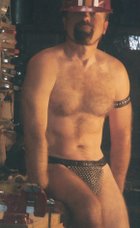
Guys: I found this great article by Brian on the http://www.washblade.com
web site.
Searching for a connection Rural gays turn to new technologies to ease sense of isolation
By BRIAN MOYLAN Jan. 26, 2007
Rural gays turn to new technologies to ease sense of isolationMANY GAY PEOPLE have a song they identify as their coming out anthem. Maybe it’s a song with lyrics about empowerment or a track that was popular in the gay bars when they first started going out. For Mike, a 42-year-old auto mechanic, his coming out anthem could be the familiar “You’ve Got Mail” greeting that sounds when he logs onto America Online.
“I knew I was gay since I was 12, but I was afraid to act on it and I didn’t know who to talk to. I didn’t start coming out until I was 30,” says Mike, who asked that his last name be withheld for privacy reasons. What made it even harder for Mike is that he grew up and still lives in Helena, Mont. Though it’s the state capital, there is only a population of 26,000 people, and the nearest gay bar is 64 miles away in Butte. There are only two other bars in the state, one in Great Falls, about 100 miles away, and one in Billings, almost 300 miles away.
He never ventured out to the bars and didn’t even know they were there when he was younger.
“I just kept to myself, rode my motorcycle and got drunk at straight bars for no reason,” he says. “My brother signed me onto America Online, and I found the men-for-men chat room, and for the first time, I thought there were more people like me.”
Twelve years later, Mike has had two long-term boyfriends (though the last one lived about 100 miles away), watches Logo — the gay cable channel — on satellite TV and is out to his family and a few people at the auto dealership where he works.
MIKE’S STORY ISN’T uncommon for gay people who live in rural communities, but the internet has ended some of the isolation for such people by letting them develop communities online and in their towns.
James Martin, a 48-year-old accounting clerk, grew up in rural West Virginia, but spent many years living in more urban areas of North Carolina before moving to Anchorage, Alaska, several years ago. Though it’s a city of 700,000 people, Martin says that he used the internet to locate other bears and community events geared for them before making the move to Alaska.
He says being able to do this research is a big shift from when he was coming out, where the only connection he had to gay people was in medical books in the local library, most of which portrayed homosexuality as a disease or something negative.
Tim Niehaus, a 21-year-old restaurant worker, also used the internet as a research tool, talking to gay people online before he ever talked to any in person. In Eagle River, Wis. (population, 1,500), that was his only resource. He now lives in Stevens Point, home to a branch of the University of Wisconsin, which boasts 20,000 people (including the university), and he met many of his gay friends online.
Though they may be spread out, there are plenty of people in rural communities to meet in online chat rooms. Jeff Soukup, president and chief operating officer of PlanetOut, Inc. — which owns the websites Gay.com and PlanetOut.com, as well as RSVP cruises and LPI Media which publishes The Advocate and Out magazines — says that half of the sites’ U.S. traffic is from the South and Midwest, where the biggest number of small towns are located. Soukup says that the company’s two sites get 5.4 million unique visitors each month.
NEWER TECHNOLOGIES ARE making it easier for gay arts and culture to come to these communities as well. Logo and Here! TV, another gay television service, reach a national audience through satellite television and digital cable (though some digital cable providers still don’t broadcast the channels in all markets). The companies are also using streaming video and podcasts on their websites to bring their programming to anyone with a high-speed internet connection. These and other technologies are out there to bridge the distance gap.
We are all connected in this great big world of ours and that brings us all together. I am so glad that technology makes us gay brothers, where ever we are. I am a better man because I know all of you. Stay warm and sexy.











6 comments:
Very interesting, Buff - and inspirational! I guess if I'd thought about it, I would say that I'm not surprised. In many ways - it's an exciting time to be alive. It seems we're shaping the future of the internet almost as much as its' exposing us to new territories.
There used to be a lively, informative and thriving site called ruralgay.com. It was run by a a gay couple who owned a big ranch and trucked. It was out there in the upper plains states, just where Mike in the article comes from. The guys found it was just too big a job to keep up (it had also become a gathering place for gay trucker fiction). It shut town three years ago tomorrow (1/28/04).
I know the movie was controversial to many gay men (particularly those who had NOT read the short story and were looking for a movie with lots of cowboy sex, out and proud) but "Brokeback Mountain" pointd up the terrible isolation of gays out there on the plains who have vast distances to travel to connect with other gay men and who desperately need the sense of community that ruralgay.com provided.
I live in an isolated town and the only gay contact that I have is through blogging. I have met some great friends and even a best friend by the internet. Technology is great for us that live in the middle of nowhere.
I love reading about 'coming out' & how others live according to location, isolation, and community support etc etc...What a great post...Thanks s much..xox
You could live in San Francisco and still feel isolated. I'm surrounded by a gay people, yet I don't know anyone. It's like living in Nome Alaska.
The Internet allowed me to connect with other gay men and actually have a life; to feel normal and be accepted. Without it, the coming out process would have been much longer and agonizing. Perhaps even unsafe. I'm thankful for the community that electronic communication has enabled.
Scott
wow, reading that made me realize that there is hope for me yet.
Post a Comment